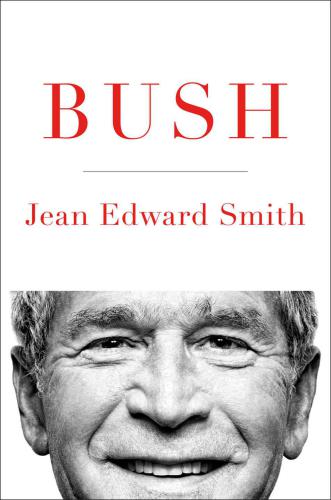
Bush
فرمت کتاب
ebook
تاریخ انتشار
2016
نویسنده
Jean Edward Smithناشر
Simon & Schusterشابک
9781476741215
کتاب های مرتبط
- اطلاعات
- نقد و بررسی
- دیدگاه کاربران
نقد و بررسی

May 2, 2016
“George W. Bush may not have been America’s worst president” is as nice as historian Smith (Eisenhower in War and Peace) gets in this hard-hitting biography. He gives the 43rd president grudging nods for his No Child Left Behind initiative, prescription-drug plan for seniors, and AIDS relief programs but otherwise portrays Bush’s eight-year presidency as a parade of disasters; irresponsible tax cuts and spiraling deficits; a simplistic, bellicose response to the 9/11 attacks; warrantless NSA surveillance and other assaults on privacy; torture of detainees; a negligent passivity toward Hurricane Katrina and the 2008 financial collapse; and above all, the Iraq War, “the worst foreign policy decision ever made by an American president.” Smith’s negativity is sometimes too much—“Like Big Brother in George Orwell’s 1984, the president launched the nation on a never-ending struggle”—but he presents a shrewd, nuanced view of Bush as an insecure, intellectually lazy man who made up for youthful fecklessness with an unwarranted overconfidence and decisiveness in office, a “personalization of presidential power” inside a bubble of sycophantic advisors. Smith embeds this portrait in a lucid, highly readable narrative, balancing rich detail with clear delineation of the larger shape of policy through the chaos of politics. This is a superb recap and critical analysis of Bush’s controversial administration. Photos. Agent: Peter Matson, Sterling Lord Literistic.

May 15, 2016
Biography of George W. Bush (b. 1946), concentrating on the eight years of his presidency. From the first sentence, accomplished presidential biographer and historian Smith (Political Science/Marshall Univ.; Eisenhower in War and Peace, 2012, etc.) establishes his critical tone: "Rarely in the history of the United States has the nation been so ill-served as during the presidency of George W. Bush." By miring the country in a disastrous war in Iraq, costing 4,000 American lives and some $3 trillion, allowing torture of "unlawful combatants" and restrictions on Americans' fundamental issues of privacy thanks to an empowered National Security Agency, the author considers Bush one of the worse presidents yet. Hurtling quickly through his subject's early life, Smith emphasizes his abysmal school records at Andover and Yale. Indeed, he was coddled as a legacy son "many times over." His penchant for "coasting" and partying kept him floundering for many years, and his well-placed parents bailed him out continuously, until he apprenticed under Lee Atwater and caught the political bug. Marrying Laura Welch, a Midland, Texas, native and librarian, and becoming a born-again Christian thanks to Billy Graham in 1983 helped center Bush's ambitions. However, Smith points out how his "religious certitude and his singular determination," as well as his braggadocio, often swayed his actions more than the advice of more experienced colleagues. Bush relied on sports-minded advisers and hawkish "vulcans" like Condoleezza Rice, Vice President Dick Cheney, and Donald Rumsfeld when the crisis of 9/11 shifted the president's focus from domestic to foreign policy, which he knew little about. Smith considers it a national shame that he was so insistent on finding a casus belli to invade Iraq--then letting Colin Powell be the fall guy--despite the resistance of the rest of the world and cowing even the Democrats in Congress. Notwithstanding Bush's global leadership on AIDS, immigration reform, and education, he left a tarnished presidency. A relentlessly hard-hitting assessment of a president who was a "decider" but "did not wrestle with the details of policy."
COPYRIGHT(2016) Kirkus Reviews, ALL RIGHTS RESERVED.

February 15, 2016
The author of the Francis Parkman Prize-winning FDR and the Pulitzer Prize finalist Grant, among other biographies of key American figures, Smith here offers a pointed assessment of President George W. Bush. He argues that in the foreign arena, Bush refused to take expert advice, basing his single-handed decision to invade Iraq on religion-driven views about the battle between good and evil. He relented during the 2008 financial crisis and paid attention to others in ways that likely saved the economy. Sure to get folks talking.
Copyright 2016 Library Journal, LLC Used with permission.

June 1, 2016
Esteemed biographer Smith (Eisenhower in War and Peace, 2012) doesn't take long to show his cards. On the opening page of this comprehensive biography of our forty-third president, he describes Bush's presidency as an unmitigated disaster. A budget surplus was squandered, the national debt exploded, a decade of relative peace was ended by involvement in two full-scale wars, and a strong economy ended in massive recession. For most of these misfortunes, Smith holds Bush directly responsible, writing that these failures resulted, to a large extent, from Bush's personal flaws. Bush is characterized as arrogant, rigid, and unwilling to consider the complexity of issues, even of his own policies. Smith dispels the commonly held notion that Bush fell victim to a cabal of ideologues, including Cheney, Rumsfeld, and various neoconservatives. Rather, Bush truly was the decider, especially on foreign policy issues, where he seems to have been strongly influenced by a sense of religious destiny. Smith's portrait is fascinating; it will take time, however, for a more balanced account of the Bush legacy.(Reprinted with permission of Booklist, copyright 2016, American Library Association.)

























دیدگاه کاربران